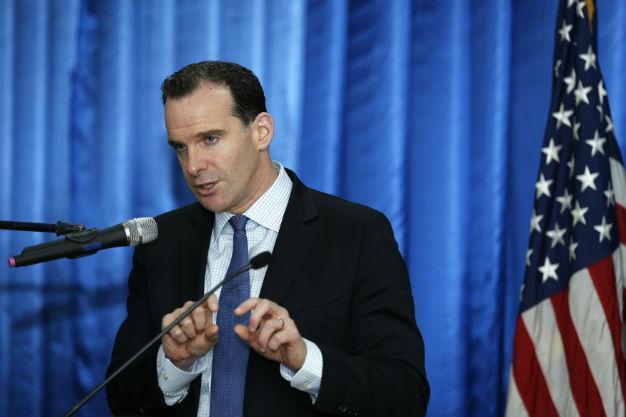US anti-ISIL envoy visits Kurdish, Arab fighters in Syria: Sources
QAMISHLI - Agence France-Presse

AFP photo
A delegation including senior U.S. diplomat Brett McGurk met members of a Kurd-Arab alliance fighting the Islamic State of Iraq and the Levant (ISIL) inside Syria, Kurdish sources said on Jan. 31.The weekend visit to the war-torn country - confirmed by a U.S. official - appeared to be the first by a senior U.S. government figure inside Syrian territory.
McGurk, who is U.S. President Barack Obama’s envoy to an international coalition fighting ISIL in Syria and Iraq, was accompanied by French and British officials, the sources told AFP.
One Kurdish source close to the meeting said a “high-level military delegation from the international coalition [against IS],” met on Jan. 30 with senior members of the Syrian Democratic Forces (SDF) alliance.
The source said the talks in the Kurdish town of Kobane covered “military plans” for the fight against ISIL.
“These meetings will have an impact on many developments that will be seen in the area,” he added, without providing further details.
The talks were confirmed by a second Kurdish source on the ground and reported in Kurdish media.
A U.S. official said that McGurk visited Syria at the weekend to take stock of the campaign against ISIL extremists, but gave few other details.
“This visit and the discussions he had are in keeping with the special envoy’s efforts to continue looking for ways to increase coalition pressure on ISIL,” said the official.
The SDF is an alliance of Syrian Kurds and Arabs who are fighting ISIL with support from the U.S.-led coalition.
It is composed mostly of the Kurdish People’s Protection Units (YPG), a powerful militia that has proved Syria’s most effective force against ISIL, along with smaller units of Syrian Arab Muslim and Christian fighters.
The meetings come after the YPG’s political wing, the Democratic Union Party (PYD), was excluded from new peace talks in Geneva being organized by the U.N.
Despite cooperation between the U.S.-led coalition and the YPG in the fight against ISIL, the Kurdish militia and its political branch face fierce opposition from neighboring Turkey.
Ankara considers the PYD and YPG to be affiliates of the outlawed Kurdistan Workers’ Party (PKK), which is designated as a terrorist organization by Turkey, the EU and U.S. Meanwhile, Syria’s opposition accuses them of being too close to the regime in Damascus.
But the coalition has worked closely with the YPG since it launched air strikes in Syria in September 2014, expanding a campaign that began in Iraq a month earlier.
And that support has continued since the formation of the SDF last October, with U.S.-led air support helping the alliance seize a key dam from ISIL last month.
















